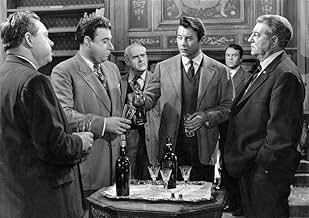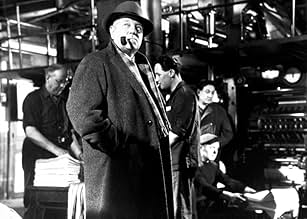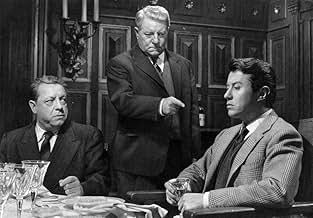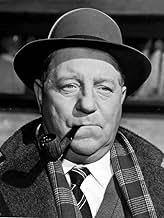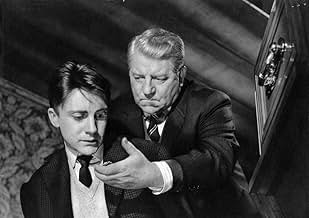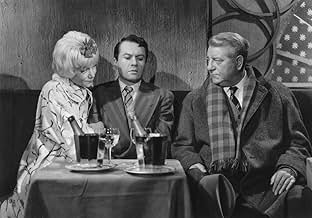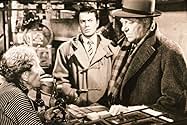IMDb RATING
7.0/10
1.6K
YOUR RATING
The Countess de Saint-Fiacre, having received a terrible anonymous letter predicting her imminent death, summons Commissioner Maigret in the hope that he can protect her and save her from a ... Read allThe Countess de Saint-Fiacre, having received a terrible anonymous letter predicting her imminent death, summons Commissioner Maigret in the hope that he can protect her and save her from a secret ill-wisher.The Countess de Saint-Fiacre, having received a terrible anonymous letter predicting her imminent death, summons Commissioner Maigret in the hope that he can protect her and save her from a secret ill-wisher.
Camille Guérini
- Gaultier - le régisseur
- (as Camille Guerini)
Bruno Balp
- Le livreur de journaux
- (uncredited)
Storyline
Did you know
- TriviaOriginal literary source : 'L'Affaire Saint-Fiacre', novel by Georges Simenon, published in Paris by Arthème Fayard & Cie, 1932, 251 pages.
- ConnectionsEdited into Tout (ou presque) sur Maigret (2009)
Featured review
In Jean Delannoy's "Maigret and the St Fiacre Affair", second cinematic adaptation starring Jean Gabin as the iconic detective, we're taken from the shadowy and menacing streets of Montmartre by night to the more bucolic and colorful Provence, a change of scenery, but not of scenario.
St Fiacre is a fictional village basking in its monotonous routine, spared by the corruptive rollercoaster of modernity, a village where the local aristocrat or the priest are emblematic and influential figures and like the church or the city council, where every place goes by one: one grocery shop, one bank, one church, one nightclub. That's St Fiacre, hidden in the middle of France's hinterland, as ordinary as any small village in France, but not that insignificant a place in the heart of Maigret for this is where he spent his childhood, as the son of the castle steward.
Maigret in Saint Fiacre is like Uncle Scrooge revisiting the McDuck castle, without the family connection. Not a blue blood but a playful little lad whose blue eyes and blonde little face didn't get unnoticed by the then younger Countess. The woman, (Valentine Teissier) now a widow, requested Maigret to come visit her after receiving a threat letter, saying she will be dead before the end of Sunday's religious office. The tone of the letter is so definite that we know it will happen for the sake of a story and this is why the first scene plays like a soothing and comforting memory-recalling moment, a little slice of sunshine before the first breezes announcing the storm.
And so the older Jules is visiting the castle of his childhood that lost its past splendor, pretending to be a painting collector, a passable cover to identify the first cover. He notices the intriguing influence the priest (Michel Vitold) has on the chatelain, smelling something that goes beyond religious bigotry, he has a talk with Lucien (Robert Hirsch) the young secretary whose disastrous management indicates that he's either incompetent or malevolent; and there's also the gruff and disagreeable chauffeur (Jacques Marais), perhaps the closest to a comic relief with Dr. Bouchardon (Paul Frankeur), an old friend of good old Jules.
That little palette of personalities paints the first shades of doubt and defiance in the meticulous mind of Maigret and the atmosphere is quite heavy-loaded during that first night where he loses track of the number of guests and visits the Countess has (for medicine or something else). We can feel the Grim Reaper hovering around the head of the poor woman and it is so ominous that her death is actually a deliverance, the tone is set and the investigation can start.
And so the news spread very quickly, taking us to the next aisle of the characters gallery: the spoiled son, Maurice (Michel Auclair) a young and idle annuitant, a playboy who enjoys the status and the money and holds a grudge against Lucien. The circle widens to other players such as Gautier the new steward (Camille Guérini) and his son Emile (Serge Rousseau), a promising and cooperative bank clerk. Yes, it's that kind of movies where the performances of the supporting cast are as integral to the enjoyment as the lead. And as the interactions go on, we smell a potential suspect in everyone but there's never a clear hint given.
For instance, the three younger men are found in the same nightclub when Gabin goes for one of his introspective walks, the only place that could justify that one would leave the castle late provides three suspects. Another hint involves the real weapon of the crime, but anyone is in position to have pulled that kind of triggered. The film shows again Maigret at his finest, testing people, not only spotting their flaws and weaknesses but determine which weakness would make for the strongest motive.
Unlike the previous "Maigret Sets a Trap" where the suspects were given, this time we're taken in a waltz of interpretations and false tracks, in situations where everyone is partially responsible for the death of the Countess but as the representative of the Law, Maigret states very clearly that he's looking for instant guilt, not responsibility. And so the film takes us to a final climax where every suspect is reunited in the same dinner table and with the crime weapon, Maigret decides to trick the killer à la Columbo (forgive the anachronism).
It's not the twist that works but the way Maigret seems to handle the investigation as a pro although he was affected by the murder, but because it's personal, he knows he must lay his cards carefully or the suspect might slip under his net, he's toying with his instinct and his determination to find the killer. One strikes as the most potential suspect but he's too weak or too convenient a killer to be such a Macchiavellian mastermind.
And Gabin's performance is a masterstroke of sobriety, of contempt toward these corrupt little people hiding behind his down-to-earth façade. He realizes the same mediocrity and deterioration of moral values and principles in these last remains of the old order. But Gabin downplays his anger to better implode it once the killer is revealed. And ironically, his final rant is perhaps the second relief in the film, not only justice will be done, but he can finally drops the investigator's mask and let the man express his rage and avenge the honor and life of the Countess who meant so much.
St Fiacre is a fictional village basking in its monotonous routine, spared by the corruptive rollercoaster of modernity, a village where the local aristocrat or the priest are emblematic and influential figures and like the church or the city council, where every place goes by one: one grocery shop, one bank, one church, one nightclub. That's St Fiacre, hidden in the middle of France's hinterland, as ordinary as any small village in France, but not that insignificant a place in the heart of Maigret for this is where he spent his childhood, as the son of the castle steward.
Maigret in Saint Fiacre is like Uncle Scrooge revisiting the McDuck castle, without the family connection. Not a blue blood but a playful little lad whose blue eyes and blonde little face didn't get unnoticed by the then younger Countess. The woman, (Valentine Teissier) now a widow, requested Maigret to come visit her after receiving a threat letter, saying she will be dead before the end of Sunday's religious office. The tone of the letter is so definite that we know it will happen for the sake of a story and this is why the first scene plays like a soothing and comforting memory-recalling moment, a little slice of sunshine before the first breezes announcing the storm.
And so the older Jules is visiting the castle of his childhood that lost its past splendor, pretending to be a painting collector, a passable cover to identify the first cover. He notices the intriguing influence the priest (Michel Vitold) has on the chatelain, smelling something that goes beyond religious bigotry, he has a talk with Lucien (Robert Hirsch) the young secretary whose disastrous management indicates that he's either incompetent or malevolent; and there's also the gruff and disagreeable chauffeur (Jacques Marais), perhaps the closest to a comic relief with Dr. Bouchardon (Paul Frankeur), an old friend of good old Jules.
That little palette of personalities paints the first shades of doubt and defiance in the meticulous mind of Maigret and the atmosphere is quite heavy-loaded during that first night where he loses track of the number of guests and visits the Countess has (for medicine or something else). We can feel the Grim Reaper hovering around the head of the poor woman and it is so ominous that her death is actually a deliverance, the tone is set and the investigation can start.
And so the news spread very quickly, taking us to the next aisle of the characters gallery: the spoiled son, Maurice (Michel Auclair) a young and idle annuitant, a playboy who enjoys the status and the money and holds a grudge against Lucien. The circle widens to other players such as Gautier the new steward (Camille Guérini) and his son Emile (Serge Rousseau), a promising and cooperative bank clerk. Yes, it's that kind of movies where the performances of the supporting cast are as integral to the enjoyment as the lead. And as the interactions go on, we smell a potential suspect in everyone but there's never a clear hint given.
For instance, the three younger men are found in the same nightclub when Gabin goes for one of his introspective walks, the only place that could justify that one would leave the castle late provides three suspects. Another hint involves the real weapon of the crime, but anyone is in position to have pulled that kind of triggered. The film shows again Maigret at his finest, testing people, not only spotting their flaws and weaknesses but determine which weakness would make for the strongest motive.
Unlike the previous "Maigret Sets a Trap" where the suspects were given, this time we're taken in a waltz of interpretations and false tracks, in situations where everyone is partially responsible for the death of the Countess but as the representative of the Law, Maigret states very clearly that he's looking for instant guilt, not responsibility. And so the film takes us to a final climax where every suspect is reunited in the same dinner table and with the crime weapon, Maigret decides to trick the killer à la Columbo (forgive the anachronism).
It's not the twist that works but the way Maigret seems to handle the investigation as a pro although he was affected by the murder, but because it's personal, he knows he must lay his cards carefully or the suspect might slip under his net, he's toying with his instinct and his determination to find the killer. One strikes as the most potential suspect but he's too weak or too convenient a killer to be such a Macchiavellian mastermind.
And Gabin's performance is a masterstroke of sobriety, of contempt toward these corrupt little people hiding behind his down-to-earth façade. He realizes the same mediocrity and deterioration of moral values and principles in these last remains of the old order. But Gabin downplays his anger to better implode it once the killer is revealed. And ironically, his final rant is perhaps the second relief in the film, not only justice will be done, but he can finally drops the investigator's mask and let the man express his rage and avenge the honor and life of the Countess who meant so much.
- ElMaruecan82
- Jul 25, 2020
- Permalink
- How long is Maigret and the St. Fiacre Case?Powered by Alexa
Details
- Release date
- Countries of origin
- Languages
- Also known as
- Megre i slucaj Saint-Fiacre
- Filming locations
- Courquetaine, Seine-et-Marne, France(Castle Saint Fiacre)
- Production companies
- See more company credits at IMDbPro
Box office
- Gross worldwide
- $14,666
- Runtime1 hour 41 minutes
- Color
Contribute to this page
Suggest an edit or add missing content

Top Gap
By what name was Maigret and the St. Fiacre Case (1959) officially released in India in English?
Answer
